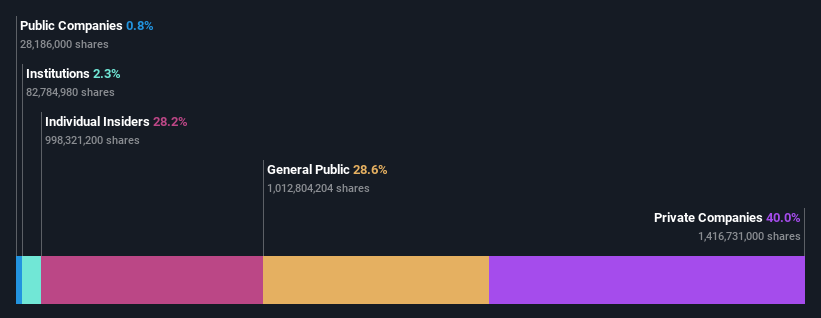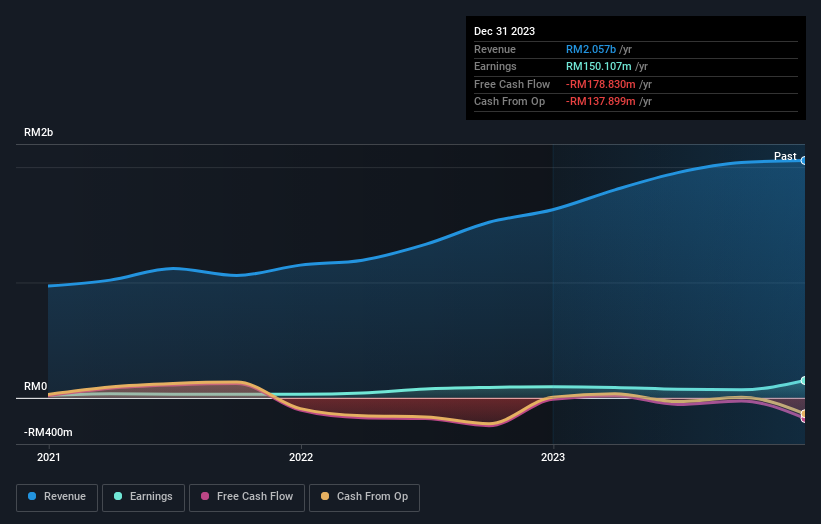Chin Hin Group Berhad's (KLSE:CHINHIN) biggest owners are private companies who got richer after stock soared 26% last week
Key Insights
The considerable ownership by private companies in Chin Hin Group Berhad indicates that they collectively have a greater say in management and business strategy
The top 2 shareholders own 58% of the company
If you want to know who really controls Chin Hin Group Berhad (KLSE:CHINHIN), then you'll have to look at the makeup of its share registry. And the group that holds the biggest piece of the pie are private companies with 40% ownership. That is, the group stands to benefit the most if the stock rises (or lose the most if there is a downturn).
Clearly, private companies benefitted the most after the company's market cap rose by RM2.3b last week.
Let's delve deeper into each type of owner of Chin Hin Group Berhad, beginning with the chart below.
Check out our latest analysis for Chin Hin Group Berhad
What Does The Institutional Ownership Tell Us About Chin Hin Group Berhad?
Institutional investors commonly compare their own returns to the returns of a commonly followed index. So they generally do consider buying larger companies that are included in the relevant benchmark index.
Since institutions own only a small portion of Chin Hin Group Berhad, many may not have spent much time considering the stock. But it's clear that some have; and they liked it enough to buy in. If the company is growing earnings, that may indicate that it is just beginning to catch the attention of these deep-pocketed investors. We sometimes see a rising share price when a few big institutions want to buy a certain stock at the same time. The history of earnings and revenue, which you can see below, could be helpful in considering if more institutional investors will want the stock. Of course, there are plenty of other factors to consider, too.
Hedge funds don't have many shares in Chin Hin Group Berhad. Our data shows that Divine Inventions Sdn. Bhd. is the largest shareholder with 38% of shares outstanding. Beng Teik Chiau is the second largest shareholder owning 20% of common stock, and Haw Chiau holds about 5.8% of the company stock. Note that the second and third-largest shareholders are also Top Key Executive and Member of the Board of Directors, respectively, meaning that the company's top shareholders are insiders.
A more detailed study of the shareholder registry showed us that 2 of the top shareholders have a considerable amount of ownership in the company, via their 58% stake.
While it makes sense to study institutional ownership data for a company, it also makes sense to study analyst sentiments to know which way the wind is blowing. We're not picking up on any analyst coverage of the stock at the moment, so the company is unlikely to be widely held.
Insider Ownership Of Chin Hin Group Berhad
The definition of an insider can differ slightly between different countries, but members of the board of directors always count. Management ultimately answers to the board. However, it is not uncommon for managers to be executive board members, especially if they are a founder or the CEO.
Most consider insider ownership a positive because it can indicate the board is well aligned with other shareholders. However, on some occasions too much power is concentrated within this group.
Our most recent data indicates that insiders own a reasonable proportion of Chin Hin Group Berhad. Insiders own RM3.2b worth of shares in the RM11b company. That's quite meaningful. Most would say this shows a good degree of alignment with shareholders, especially in a company of this size. You can click here to see if those insiders have been buying or selling.
General Public Ownership
The general public, who are usually individual investors, hold a 29% stake in Chin Hin Group Berhad. This size of ownership, while considerable, may not be enough to change company policy if the decision is not in sync with other large shareholders.
Private Company Ownership
We can see that Private Companies own 40%, of the shares on issue. Private companies may be related parties. Sometimes insiders have an interest in a public company through a holding in a private company, rather than in their own capacity as an individual. While it's hard to draw any broad stroke conclusions, it is worth noting as an area for further research.
Next Steps:
It's always worth thinking about the different groups who own shares in a company. But to understand Chin Hin Group Berhad better, we need to consider many other factors. Take risks for example - Chin Hin Group Berhad has 2 warning signs (and 1 which doesn't sit too well with us) we think you should know about.
Of course, you might find a fantastic investment by looking elsewhere. So take a peek at this free list of interesting companies.
NB: Figures in this article are calculated using data from the last twelve months, which refer to the 12-month period ending on the last date of the month the financial statement is dated. This may not be consistent with full year annual report figures.
Have feedback on this article? Concerned about the content? Get in touch with us directly. Alternatively, email editorial-team (at) simplywallst.com.
This article by Simply Wall St is general in nature. We provide commentary based on historical data and analyst forecasts only using an unbiased methodology and our articles are not intended to be financial advice. It does not constitute a recommendation to buy or sell any stock, and does not take account of your objectives, or your financial situation. We aim to bring you long-term focused analysis driven by fundamental data. Note that our analysis may not factor in the latest price-sensitive company announcements or qualitative material. Simply Wall St has no position in any stocks mentioned.

 Yahoo Finance
Yahoo Finance 

